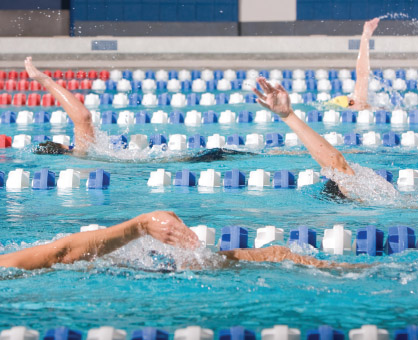Injuries and Other Challenges: Workarounds for Working Out
Ellen J. Langer said, “It is not primarily our physical selves that limit us, but rather our mindset about our physical limits.”
Physical limits come in all shapes and sizes. From asthma to sprained ankles to severe disabilities that require lifelong home care or institutionalization, some of us face greater limits than others. When we’re faced with very real physical limits, it’s important to look them in the eye and consciously create a mindset that serves us rather than the limitation itself.
We’ve all heard stories about promising Olympic athletes who suffer a misfortune, and after pronouncements from doctors that they will forever be impaired/quadriplegic/brain damaged, go on to win a
dozen or more gold medals. For most of us, reality is not nearly so dramatic. We wake up with a stiff back and aren’t sure if we can go to the exercise class we’d planned on. A migraine comes on in the middle of the work day and we don’t know if we can get through a presentation. Our knee acts up and we wonder what to do about the promise we made our kid to play baseball.
Here are some common tips/workarounds for physical limitations/pain/illness:
> Don’t Eliminate Your Exercise Plan, Modify It.
If your tennis elbow prevents you from going to the upper body weight lifting class, then get a couple miles in on the treadmill. If you used to do squats, which now hurt your knee, default to upper body. There are some great cardio workouts, all done seated in a chair, on YouTube. And there’s always the option to reduce the intensity or duration of a workout, which still does you a lot more good than scrapping it all together.
> Learn to Like the Pool. If you have chronic joint pain, or a temporary injury, the therapy or lap pool is frequently your best option. Continuing to say that you are not a water person or you can’t stand to put on a bathing suit means that you are denying yourself a great opportunity to exercise in a way that’s helpful to your body. Change your attitude on this one, get yourself access to a pool, and go to it. And give yourself the reward of the hot tub or sauna afterwards.
> Be Healthy Another Way. Sometimes it is truly best to eliminate your exercise plans completely and let yourself rest. When this happens, it’s a great day to eat lots of green vegetables, drink plenty of water, and make nutrition and different strategies of self-care your priority. You may not be able to exercise, but you can nourish yourself in other ways.
> Do Rehab Work. Maybe you have old exercises from your time in physical therapy a year or two ago. Maybe you need to get a referral from your doctor to schedule some physical therapy for the first time. Whatever a clinician has told you to do for your injury (icing, wrapping, etc.), make sure you’re doing it. Perhaps you have four stretches that always help you and you haven’t been good about doing them. Maybe you need therapeutic massage/acupuncture/dry needling. This is all important maintenance and management. And if you’re hedging because these things cost money, evaluate what else you can give up instead, preferably something that might not be that good for you anyway. Your daily $4 latte? Your regular Friday night evening of pizza and beer/wine? Soda? You’ll find yourself free of a bad habit and free to put your money in the best investment ever – a healthier you.
> Don’t Let Your Injury Injure Your Spirit. This is the toughest one. When we have a limitation, particularly if we are in pain, it’s very easy to become a completely different person – the kind who turns down invitations to things that would feed their soul, who fixates on what’s wrong rather than right, who becomes sharp with people who don’t deserve it. Pain is a remarkably powerful change agent, and most of the changes it triggers are not positive. Many chronic issues, by their very definition, injure our spirits (most mental health issues, for example). Folks familiar with pain will tell you that they work to be constantly vigilant in determining when their pain is threatening to hijack their usual reserve of hope and goodwill. Meditation, support groups, gratitude journaling or other exercises can all be helpful. Whatever we can do to isolate our issue and detach our limitation from the potential of joy-giving activities/events/thoughts will only help.
Brought to you by Beacon Health & Fitness and Bridget Hardy, a BHF wellness coach, personal trainer and group exercise instructor.







